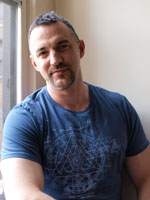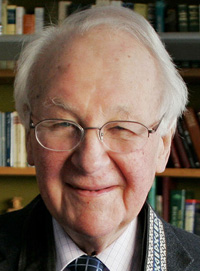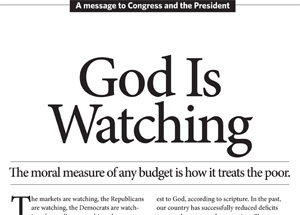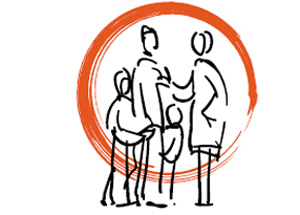Children
[Editors' note: This post is part of a series over the last few weeks on youth homelessness. In the September/October issue of Sojourners magazine, the Ali Forney Center and the Gay and Lesbian Alliance Against Defamation (GLAAD) ran an ad to raise awareness of the serious problem of LGBT youth homelessness.]
homelessness.]
Fact 1) About 40 percent of the homeless youth in the United States identify as lesbian, gay, bisexual, or transgender.
Fact 2) One in four teens rejected by their families becomes homeless.
Fact 3) Parents who identify as strongly religious are three times more likely to reject their children.
Yet for Carl Siciliano, founder and president of the Ali Forney Center, these aren't just facts -- they are his daily life.
It was over in less than a minute. Three miles below the surface of the earth near a town in Virginia called Mineral, a fault line shifted. As a result, a 5.8 magnitude earthquake was felt from Georgia to New England and as far west as Detroit. The National Cathedral lost several stone spires, the Washington Monument cracked, and Sojourners' office was closed for the afternoon, as our building was checked for structural damage.
Tectonic plates move beneath our feet in the part of the globe that scientists refer to as the lithosphere. Over the course of a year, an average plate will move as little as 3 to 6 centimeters. The speed of their movement is 10,000 times slower than the hour hand on a clock and even slower than the rate of growth of human hair. For decades, sometimes centuries or millennia, a plate's movement might go almost entirely unnoticed. Then, in less than a minute, the world shakes and everything changes.
Yesterday afternoon I found out that ABC news plans to dedicate it programming today to "Hunger at Home: Crisis in America." It precipitated my writing of this post which I had planned to add as a later addition to a series on tools for prayer.
One important item in our prayer toolkit is knowledge of our hurting world. Not knowledge for the sake of knowledge, but knowledge that equips us to respond. Becoming aware of the needs in our world can lead us into a deeper understanding of the ache in God's heart for our hurting friends and neighbors. It can also connect us to our own self-centered indifference that often makes us complacent when God wants us to be involved. And it can stimulate us to respond to situations that we once felt indifferent to.
About two years ago, Minhee and I made one of the hardest decisions we've made thus far in our marriage and in our calling as parents.
In our hope to honor a conviction of the Holy Spirit to give up a year's salary, we had begun the two-year process of saving, selling, and simplifying in 2007. Our goal was to come up with our then year's wages of $68,000 -- in order to launch One Day's Wages. With only a few months left to come up with the total sum, we were a bit short and decided to sublet our home for couple months and asked some friends if we could stay with them on their couches or their guest room.
Needless to say, it was a very humbling time.
Our instruction for ourselves and our children were very simple: Each person gets one carry-on bag for their belongings.
When I first visited Ethiopia at the height of the 1984 famine, I watched as twenty-four people died of starvation in less than fifteen minutes, right in front of my eyes. Barely five years into my career as a Congressman, nothing my staff told me beforehand could have prepared me for what I saw on that trip.
Gasping at awful photographs of unspeakable human suffering is one thing; bearing firsthand witness to human suffering is another thing entirely. Glancing at a picture of a starving child in the newspaper, you can always turn away, but when you're staring into the eyes of a mother who has just lost that child, it's a completely different story. There's no looking the other way.
That's why I often describe those first Ethiopia experiences as my "converting ground" on issues of global hunger. What happened in Ethiopia changed me, and changed how an entire generation looks at hunger.
It's also why I'm currently back on the Horn of Africa, reporting on the ground from the Dadaab refugee camp in eastern Kenya, less than fifty miles from the Somali border. And I am appealing to my affluent brothers and sisters in the United Stated and around the world not to look away. We need your help.
Some sources have stated that more than 12 million people are being impacted by the worst drought and famine in the region of the Horn of Africa in 60 years.
12 million people.
How do you wrap your head around such a number?
12,000,000
You begin with one.
The World Food Programme, for example, has shared that they can provide a nutritious meal for one person for .17
I hate war. I do not hate it because people die. Death is inescapable. And believers believe that we will meet those we love again in heaven. I hate war with a perfect hatred because it causes suffering and robs the world of incalculable human possibilities. It pains the earth. It creates waste and the misallocation of resources.
Saturday, August 6, 30 Americans and eight Afghans were killed when Taliban insurgents shot down a Chinook transport helicopter. The New York Times called it: "the deadliest day for American forces in the nearly decade-long war in Afghanistan."
 An account in The New York Times by Ethan Bronner reports that Israeli women and West Bank Palestinian women and girls have once again broken Israeli laws. They have gone swimming in the Mediterranean Sea.
An account in The New York Times by Ethan Bronner reports that Israeli women and West Bank Palestinian women and girls have once again broken Israeli laws. They have gone swimming in the Mediterranean Sea.
More than two dozen Israeli women invited Palestinian women and girls from the southern part of the West Bank of the Jordan River -- who are not normally allowed into Israel and have no access to the sea -- to go swimming with them. Under Israeli military occupation since 1967, according to Bronner, "most had never seen the sea before."
I have gotten so used to stories of violence in the news every morning that I confess they don't move me as much as they should, or used to. Today: Three straight days of killing in Karachi with 42 dead; Syrian tanks shelling the city of Hama, where more than 100 people have died since Sunday; U.N. peacekeepers killed by a landmine in Sudan; daily deaths in Libya; bombings in Baghdad and assassinations in Kandahar. It goes on and on.
The debate we have just witnessed has shown Washington, D.C. not just to be broken, but corrupt. The American people are disgusted watching politicians play political chicken with the nation's economy and future. In such a bitter and unprincipled atmosphere, whoever has the political clout to enforce their self-interest and retain their privileges wins the battles. But there are two casualties in such political warfare: the common good and the most vulnerable.
So how will vulnerable people fair under this deal? "The Circle of Protection," a diverse nonpartisan movement of Christian leaders, has been deeply engaged in the budget debate to uphold the principle that low-income people should be protected. But it is hard to evaluate a deal that averts a crisis when the crisis wasn't necessary in the first place. Over the past few weeks, our economy has indeed been held hostage as politicians negotiated the price of the release. Ultimately, I think most of us wish that no hostages had been taken in the first place, and this was no way to run a government or make important budget decisions.
The other day the mail brought an advertisement for something I desperately need (or so the ad suggested). If I ordered it right now, the ad said, I would save a hefty percentage off the usual price. In vain I searched the flyer for the price. None was listed -- not the total, not my monthly payment. I was apparently supposed to place my faith in the kindly marketers and order it anyway.
I guess I should be used to this sort of marketing. After all, that's how our federal government does business. Shall we a. fight a war in Iraq? b. add a war in Afghanistan? c. subsidize medical care for seniors and the poor? d. rescue failed financial institutions? e. subsidize growers of corn and soybeans? or f. fund interstate highways?
When John Steinbeck's classic novel The Grapes of Wrath was published in 1939, it caused a sensation. It won the Pulitzer Prize and was the best-selling novel of the year. Just months later, in 1940, the book was turned into a film by John Ford, which was nominated for seven Academy Awards.
For readers today, Steinbeck's migration saga remains relevant as a piece of (dramatized) social analysis. It's essentially a road novel about the Joads, a poor Midwestern migrant farming family. Throughout the novel, the Joads fight to keep their family intact while fleeing the 1930s Oklahoma Dustbowl for the hope of farm work in California.
 [Editors' note: Rev. John Stott, one of the world's most influential evangelical figures over the past half-century, died this Wednesday at age 90. Rev. Stott served as a contributing editor for Sojourners magazine, when we were known as The Post American, and wrote this article for the November/December, 1973 issue of the magazine. We will always remember Rev. Stott for his profound contributions to our community and the Church.]
[Editors' note: Rev. John Stott, one of the world's most influential evangelical figures over the past half-century, died this Wednesday at age 90. Rev. Stott served as a contributing editor for Sojourners magazine, when we were known as The Post American, and wrote this article for the November/December, 1973 issue of the magazine. We will always remember Rev. Stott for his profound contributions to our community and the Church.]
It seems to be a characteristic of the Anglo-Saxon mind to enjoy inhabiting the "polar regions" of truth. If we could straddle both poles simultaneously, we would exhibit a healthy balance. Instead, we tend to "polarize". We push some of our brothers to one pole, while keeping the other as our own preserve.
What I am thinking of now is not so much questions of theology as questions of temperament, and in particular the tension between the "conservative" and the "radical."
 The markets are watching, the Republicans are watching, the Democrats are watching, the media are watching, the pollsters and pundits are watching. The public is watching and is disgusted with Washington, D.C.
The markets are watching, the Republicans are watching, the Democrats are watching, the media are watching, the pollsters and pundits are watching. The public is watching and is disgusted with Washington, D.C.
When it comes to the bitter and ultra-partisan battles over the budget, the deficit, and the fast-approaching deadline for America defaulting on its financial commitments, the whole nation and even the world is watching.
But God is watching too.
"And all ate and were filled; and they took up what was left over of the broken pieces, twelve baskets full. And those who ate were about five thousand men, besides women and children." --Matthew 14:13-21
Immediately before the story of the feeding of the 5,000 is a description of a very different sort of meal: John the Baptizer's head on a platter. And just as women and children are included among the multitude fed on the beach (a detail unique to Matthew's version of the story), the female sex is also represented in the account of John's demise: Herodias, sister-in-law of Herod, asks for the head of the Baptist; her nameless daughter, with no detectable squeamishness, delivers the request to the king and serves up the plated head to her mother. (That women in all of their moral complexity are present throughout Matthew's gospel - recall also the women who appear in the genealogy of Jesus in chapter one -- is an observation worthy of closer scrutiny. See, for instance, Jane Kopas's 1990 essay in Theology Today).
 Today, I, alongside other faith leaders, met with President Obama about the critical budget debate. We are grateful and hopeful leaving this meeting. Please pray for us as the conversation continues.
Today, I, alongside other faith leaders, met with President Obama about the critical budget debate. We are grateful and hopeful leaving this meeting. Please pray for us as the conversation continues.
Since early this spring, Sojourners, with your invaluable help, has strongly advocated with the president and Congress, asking for a responsible plan to reduce our nation's deficit -- a plan that protects the poorest and most vulnerable. We have asked, "What Would Jesus Cut?" We have prayed and fasted, and now thousands of you have signed on to the Circle of Protection: a statement on why we need to protect programs for the poor.
 Several weeks ago (right before I left for my sabbatical), I joined with six other pastors from around the country -- in partnership with Sojourners -- to draft an open letter to Congress and President Barack Obama regarding the budget and the proposals to cut certain programs that aid the poor in our country. Our hope was to invite at least 1,000 pastors to join us in signing this document.
Several weeks ago (right before I left for my sabbatical), I joined with six other pastors from around the country -- in partnership with Sojourners -- to draft an open letter to Congress and President Barack Obama regarding the budget and the proposals to cut certain programs that aid the poor in our country. Our hope was to invite at least 1,000 pastors to join us in signing this document.
As of today, we've had nearly 5,000 pastors and Christian leaders from all 50 states join us in signing this open letter, and we hope to keep adding voices and signatures. As a pastor and Christian leader will you add your voice to let our political leaders know that you stand with the poor?
Read the letter below and if you resonate with our message, please sign your name.
The way you think and feel about the world is shaped by what you see when you get out of bed in the morning. I remember hearing this from civil rights activists. It simply means that perspective is hugely determined by place, context, and vantage point. This is profoundly true for me and most of the people I've ever met. You see the world from the place you live.
Part of the problem in the current budget impasse in Washington, D.C. is the perspectives of the politicians in the debate. Every morning they see and hear each other; the gladiator ring of national politics; the Washington media; their donors; their ideological base; and their latest poll ratings.